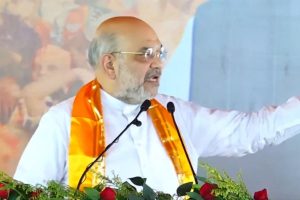The West Bengal Government’s decision to open English sections in as many as 100 government and government aided Bengali-medium schools has caused euphoria among students, teachers and guardians. The policy envisages English medium facilities from the primary to higher secondary levels. The objective is to stop the mass exodus of students to private English medium schools.
Some express doubt about the efficacy of the policy; others are hopeful about the outcome of the action. Two changes will come from the introduction of English sections. First, English will replace Bengali as a medium of instructions. Second, teachers will find themselves in an ideal classroom situation with only 40 students.
But they are not enough to win the confidence of guardians. Both English and Bengali sections will read or use books with the same content for all subjects. The difference lies only in the language or medium of instruction. Translations are not up to the mark. Both the subject and the language must be grasped with equal measure. Another impediment is a woeful dearth of teachers who are qualified to teach in English.
Most teachers with Bengali medium background get scared at the idea of imparting instructions in English. Once they fathom the weight of the new responsibility, they will find teaching in English-medium sections a challenge. A few, too few, have the confidence to rise to the occasion.
Such being the case, the new sections will be in shambles. It is imperative for the government to open pure English-medium schools, rather than split the medium of instruction in each of the 100 schools. They should be raised to the status of model schools.
What will happen to the majority of schools that will not have English sections? It is a matter of grave concern. A complete overhaul of the school education system is required.
Teaching is the only profession without any provision for probation. In other professions, be it a government job or a corporate job, a probationary period is part of the service. But many embark on a teaching career at school level without the right mindset. Sensitising new recruits to the core aspects of teaching can give them a good start.
Albert Einstein said,” Education is not the learning of facts; it is rather the training of the mind to think.”
Bookish knowledge alone cannot produce ideal students. If the student’s mind is properly trained to think, classes can be more effective. Without the learner’s optimum concentration on lessons, a class, whether small or large, cannot be effective. They should be encouraged to study great minds like A P J Abdul Kalam, Swami Vivekananda and others. Participation in cultural activities is useful for them. It can discipline unruly students. Regrettably, there is no place for art in our education system; nor is there ample scope for employment in the field of art. We speak highly of those who opt for medical or engineering courses or white collar jobs. But we neglect those who wish to build a career in any performing or visual arts.
After the Madhyamik examination, most students start HS courses without any definite goal. If they are asked to tell their future plan, they remain silent. As a result, they cannot pay attention to their studies either at home or at school. Teachers and parents should address this problem. Once they set their goal half the battle for their education is over. Inquisitive minds never pose any problems to even an overcrowded class. Even a most dedicated teacher fails to teach effectively if the student has no desire to learn. Students must have dreams of their own. But their dreams must be specific, measurable, achievable, realistic and time-bound (SMART). Here lies the importance of career counseling. The student’s interest or choice regarding their course of studies should be given utmost importance.
The medium of instruction alone is not important. What takes place in the classroom, to a certain extent, can motivate or demotivate a student to attend classes regularly. Whether a student requires private tuition or not is a debatable issue. Without good infrastructure, a school cannot stop students from turning to private tuition. Doubt clearing classes are important. For paucity of time in an overcrowded class, students sometimes return home with an inadequate understanding of a topic discussed by the teacher. They need clear concepts. Classes should be interactive. Just putting an end to private tuition is not enough to improve the standard of school education.
In most cases the concept of joyful learning does not work. Learning becomes a burden for students. Those who are sincere exploit every opportunity to learn both at home and at school. Less receptive or less attentive students cause a lot of trouble. It is difficult even for a competent and sincere teacher to do something for him or her. Teachers are not always to blame for the sorry state of school education.
Teachers and parents are supposed to be students’ primary role models. They should protect them from myriad distractions which electronic gadgets may cause to them. We all know that home is where education begins. Parents should be active partners in the process of children’s education. Stress on character-building is necessary. If a student’s mind is imbued with values of life he or she is unlikely to be a burden to his or her parents or to society. The aim of education is to produce better minds that can create better society or better nation. Policy makers must lay stress on value education.
So far, we have cried ourselves hoarse over the problem of overcrowded classes. Now those who have got the opportunity to teach in small English-medium sections are expected to make the most of it. Their experiences will help them to improve the classroom situation in Bengali sections. Many opine that English section students will enjoy more privileges, affecting their Bengali-medium peers psychologically. It is true.
But the achievements of English medium sections will inspire less privileged classes to change for the better. In Bengali medium sections there are many teachers as well as students who can communicate In English. But they do not feel disposed to do that.
I sincerely believe that in-service orientation programmes play an important role in teacher development and teacher empowerment. What little success I have achieved as a teacher is largely due to my exposure to new ideas I received from resource persons either personally or at workshops. It is gratifying to see that the service of the distinguished British Council linguist, Ms Margaret Waterward, has been enlisted for Teacher Orientation Programme for Sourindra Government English Medium School, Behala, Kolkata. Such facility should be made available to all the Bengali medium schools that have introduced English sections. Training and re-training will never allow a teacher to be in a rut. But an orientation programme cannot bring about the desired result without proper follow-ups.
The SCERT has taken a robust initiative to improve the quality of school education. In-service Teacher Orientation Programme has been undertaken through West Bengal. The use of Information Communication Technology (ICT) is an integral part of project-based learning (PBL). It can make classroom activities effective, offering scope for both joy and learning. Computer-savvy teachers are likely to benefit from orientation programmes on ICT.
Poor infrastructure in government and government-aided schools remains a major impediment to the integration of ICT with the teaching learning process. The existing facilities in schools need to be improved.
(The writer is Assistant Teacher, Chakdaha Ramlal Academy, Nadia)











